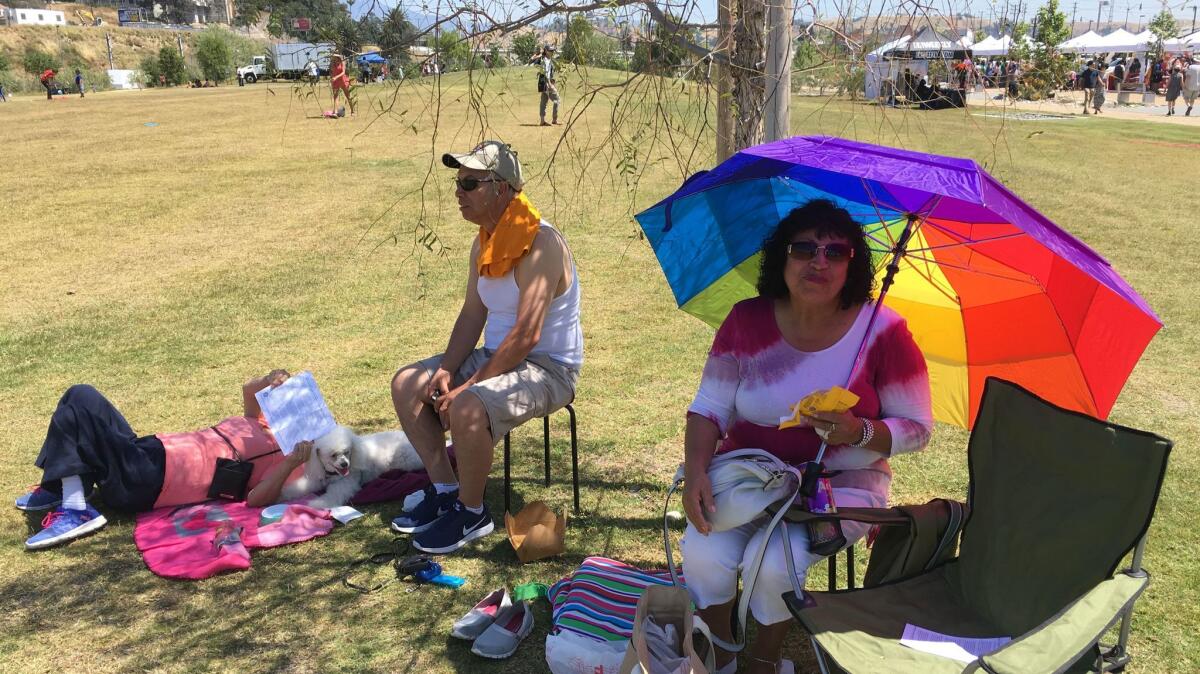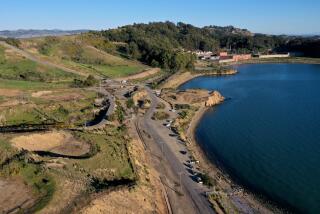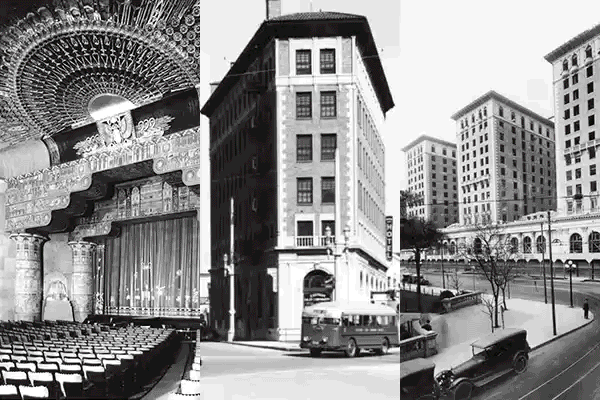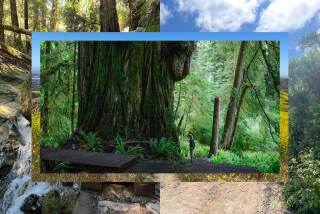Los Angeles State Historic Park bridges past and present at grand opening celebration

Hundreds of people from every corner of Los Angeles County — along with the state’s top political leadership and the chief of a Los Angeles Native American tribe — celebrated Saturday morning the opening of California’s newest state park, situated on a former rail yard with a stunning view of the Los Angeles skyline.
The park on its first day was bustling with personal activity while politicians gave long speeches in blistering April sunshine.
Families walked along gravel paths, pushing strollers with sleeping babies. Dads and moms threw Frisbees with their toddlers. Red kites filled the sky. Older visitors crowded under tiny trees to get a bit of shade while they munched on treats.
“I’m only sorry I didn’t bring my little dog,” said Norma Bravo, who traveled from San Fernando for the grand opening. “Next week, I’ll be back with my dog and my granddaughter.”
Los Angeles State Historic Park is sandwiched between an old industrial district and bluff-top Chinatown neighborhoods, aiming to provide open space in one of the city’s park-poor districts.
But as a state park dedicated to history, it will not have many of the recreational facilities of typical urban parks. There are no swings, jungle gyms, barbecue grills, basketball courts or other pieces of park infrastructure. In their place is a vast open space with drought-tolerant bushes, a giant, crescent-shaped lawn and decomposed granite paths that encourage a stroll.
The park could host community events or music festivals, but its main mission is to provide a large open space where visitors can find room for their own activities, park rangers said.
“I was just saying to someone … why can’t we build a big swimming pool over here,” Gov. Jerry Brown joked at the end of a three-minute speech, the shortest of about a dozen addresses delivered from a shaded stage set up in the middle of the park.
Chief Red Blood, aka Anthony Morales, of the Gabrielino-Tongva tribe and his son Guiding Young Cloud, aka Andrew Morales, prayed, “Oh my ancestors, listen to my heart,” in their native tongue before Brown spoke.
Brown seemed moved by the prayer and turned his attention to the long history of the land that lies next to the Los Angeles River, noting that 20,000-year-old arrowheads have been found in the area.
“The natives were here 200 times longer than the present American civilization,” he said. “The question is whether we are going to keep it going that amount of time. If we are, we are going to need a lot of parks. We are going to have to protect the environment and respect each other so we don’t destroy everybody, because that’s what our general penchant is.”
The park took 16 years to develop, encountering many delays along the way. In 2001, environmentalists, community activists and Los Angeles River advocacy groups defeated a plan by then-Mayor Richard Riordan to create 1,000 jobs with an industrial park on the former Southern Pacific switching yard.
Councilman Gil Cedillo was the only speaker who mentioned the trade-off between jobs and parkland. “There was this debate. Some people wanted jobs,” he told the crowd. “In the beginning, who could argue against jobs? It took the community to come together.”
In an interview afterward, Cedillo acknowledged that the case for jobs was strong and reasoned, but the lack of parks in his district and the relatively few jobs that the industrial park would have created won the argument. In the future, Cedillo said, he expects housing and mixed-use development will surround the park, making it less isolated from the city’s residential communities.
Curt Robertson, a retired county parks employee from Mount Washington, was among the many jubilant visitors as he strolled around the perimeter. “I have been waiting for this for a long time,” he said. “It is a long-term investment. It shows respect for the land.”
Sean Woods, superintendent of California State Parks’ Los Angeles sector, said he was exhilarated by turnout on the park’s first day.
“It is only until you open the gates that you know what your impact will be,” he said. “It is incredible to see the range of activities here on the first day.”
ALSO
5 arrested at Coachella, accused of stealing cellphones, cash, credit cards
‘We need to be out here’: Thousands march in downtown L.A. to support science in the Trump era
More to Read
Sign up for Essential California
The most important California stories and recommendations in your inbox every morning.
You may occasionally receive promotional content from the Los Angeles Times.











